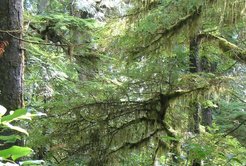Inconspicuous but important - lichens and mosses contribute to the global water cycle
Lichens and mosses are rather inconspicuous plants. They grow on rocks, walls or tree trunks. Researchers of the University of Potsdam, the Max Planck Institute for Biogeochemistry Jena and the American Georgia Southern University have now discovered that these organisms absorb a significant part of the precipitation, which then evaporates directly back into the atmosphere. In doing so, lichens and mosses not only contribute decisively to the global water cycle, but also have a cooling effect on the regional temperature of the land surface. The results of the study have just been published in the journal Nature Geoscience.

Media information of University Potsdam
Lichens and mosses are ubiquitous: In many cold and warm deserts they are the most common vegetation. They often grow as "sit-up plants" on trees in the humid forests of the tropics and the temperate zones. These organisms have the ability to accumulate large amounts of water. Therefore they serve as storage for precipitation, which does not reach the ground, but evaporates again. Scientists call the evaporation of precipitation before it seeps into the soil an interception. Not only lichens and mosses, but also leaf surfaces of trees, grasses, and shrubs contribute to interception. This is an important process that accounts for up to 30 percent of the global evaporation of water on land.
Using a computer model, the Potsdam researchers have discovered that lichens and mosses play a major role in global interception. The interception calculated with the model increased by 60 percent due to the influence of lichens and mosses. "This contribution has not yet been taken into account in global land surface models that simulate the water cycle and land surface temperature. If changes in the global biomass of lichens and mosses should occur in the course of climate change or land use change, this will probably also have an impact on the global water cycle and the land surface temperature," said Dr. Philipp Porada of the University of Potsdam.












